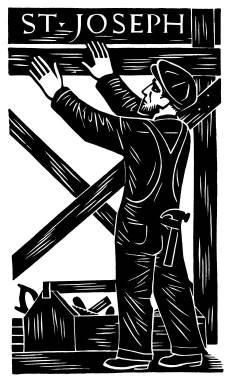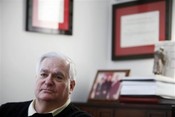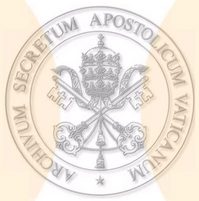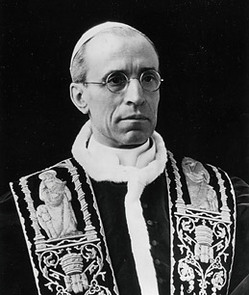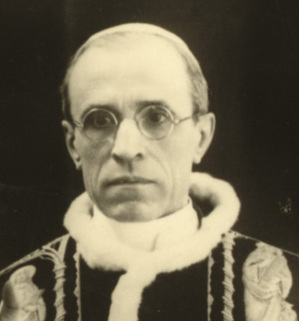 In Your wise providence, O God, You wished Your servant Pius XII to be counted one of the Popes. Please number him also among the company of Your saintly Pontiffs, we beg You, since he ruled as Vicar on earth of Your only Son. This we ask through the same Jesus Christ, our Lord. Amen.
In Your wise providence, O God, You wished Your servant Pius XII to be counted one of the Popes. Please number him also among the company of Your saintly Pontiffs, we beg You, since he ruled as Vicar on earth of Your only Son. This we ask through the same Jesus Christ, our Lord. Amen.
Born: March 2, 1876
Ordained Bishop: May 13, 1917
Elected Pope: March 2, 1939
Dies: October 9, 1958
To note, Religious Teachers Filippini Sister Margherita Marchione recently published another
 book on Pope Pius; this one is entitled, Pius XII: The Truth Will Set You Free (Paulist Press) with a prologue written by Cardinal Tarsicio Bertone, the Secretary of State to His Holiness Pope Benedict XVI.
book on Pope Pius; this one is entitled, Pius XII: The Truth Will Set You Free (Paulist Press) with a prologue written by Cardinal Tarsicio Bertone, the Secretary of State to His Holiness Pope Benedict XVI.
Today, Pope Benedict celebrated the Sacrifice of the Mass for the repose of Pope Pius and then visited the tomb in the Vatican grotto.
Pope Benedict's homily can be read here. But a few things stand out in what the Pope said:
The war highlighted the love he felt for his "beloved Rome", a love demonstrated by the intense charitable work he undertook in defense of the persecuted, without any distinction of religion, ethnicity, nationality or political leanings. When, once the city was occupied, he was repeatedly advised to leave the Vatican to safeguard himself, his answer was always the same and decisive: "I will not leave Rome and my place, even at the cost of my life" (cf Summarium, p. 186). His relatives and other witnesses refer furthermore to privations regarding food, heating, clothes and comfort, to which he subjected himself voluntarily in order to share in the extremely trying conditions suffered by the people due to the bombardments and consequences of war (cf A. Tornielli, Pio XII, Un uomo sul trono di Pietro). And how can we forget his Christmas radio message of December 1942? In a voice breaking with emotion he deplored the situation of the "the hundreds of thousands of persons who, without any fault on their part, sometimes only because of their nationality or race, have been consigned to death or to a slow decline" (AAS, XXXV, 1943, p. 23), a clear reference to the deportation and extermination of the Jews. He often acted secretly and silently because, in the light of the concrete realities of that complex historical moment, he saw that this was the only way to avoid the worst and save the largest possible number of Jews. His interventions, at the end of the war and at the time of his death, received numerous and unanimous expressions of gratitude from the highest authorities of the Jewish world, such as, for example, the Israeli Foreign Minister Golda Meir, who wrote: "During the ten years of Nazi terror, when our people went through the horrors of martyrdom, the Pope raised his voice to condemn the persecutors and commiserate with their victims", ending emotionally: "We mourn a great servant of peace."
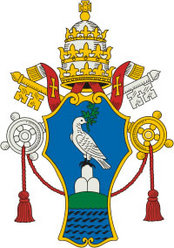 AND
AND
With the Encyclical Mystici Corporis, published on 29 June 1943, while war still raged, he described the spiritual and visible relationships that unite men to the Word Incarnate, and he proposed integrating into this point of view all the principle themes of ecclesiology, offering for the first time a dogmatic and theological synthesis that would provide the basis for the Conciliar Dogmatic Constitution Lumen Gentium.
A few months later, on 20 September 1943, with the Encyclical Divino afflante Spiritu he laid down the doctrinal norms for the study of Sacred Scripture, highlighting its importance and role in Christian life. This is a document that bears witness to a great opening to scientific research on the Biblical texts. How can we not remember this Encyclical, during the course of the work of this Synod that has as its own theme "The Word of God in the Life and the Mission of the Church"? It is to the prophetic intuition of Pius XII that we owe the launch of a serious study of the characteristics of ancient historiography, in order to better understand the nature of the sacred books, without weakening or negating their historical value. The deeper study of the "literary genres", whose intention is to better understand what the sacred author meant, was viewed with a certain suspicion prior to 1943, in part thanks to the abuse that had been made of it. The Encyclical recognized that it could be applied correctly, declaring its use legitimate not only for the study of the Old Testament, but also the New.
AND AND
...Mediator Dei, dedicated to the liturgy, published 20 November 1947. With this document, the Servant of God provided an impulse to the liturgical movement, insisting that "the chief element of divine worship must be interior. For - he writes - we must always live in Christ and give ourselves to Him completely, so that in Him, with Him and through Him the heavenly Father may be duly glorified. The sacred liturgy requires, however, that both of these elements be intimately linked with each another... Otherwise religion clearly amounts to mere formalism, without meaning and without content".
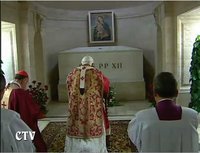 May his memory be eternal!
May his memory be eternal!
